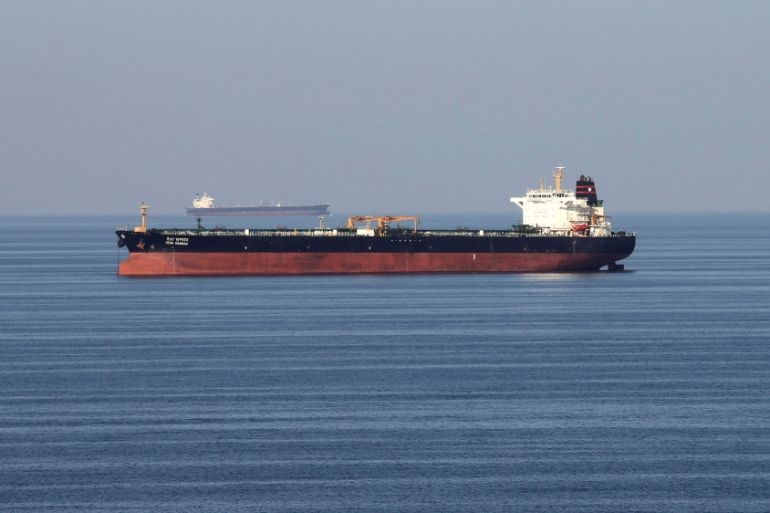Iran: Business as usual in Strait of Hormuz after blacklisting
No change in US military behaviour despite Washington’s blacklisting of Revolutionary Guard Corps, Iranian general says.

US navy interaction in Gulf waters with Iran’s Revolutionary Guard Corps (IRGC) remains unchanged despite Washington’s decision to blacklist the elite force as a “foreign terrorist organisation” and clamp down on Iranian oil exports, an Iranian general said.
Chief of staff of Iran’s armed forces, Major-General Mohammad Baqeri, said on Sunday the IRGC – which ensures security in Gulf waters and the Strait of Hormuz for Iran – had not observed any change in the US military’s behaviour towards the force after the blacklisting.
Keep reading
list of 4 itemsWhat does Israel want to do after Iran’s drone and missile attacks?
Mexico to Iran, why are attacks on embassies so controversial?
US sanctions shipping firm accused of links to Iran, Yemen’s Houthis
“US warships are obliged to respond to the IRGC on the passage of the Strait of Hormuz … and until yesterday they have been answering IRGC questions, and we have not seen change in their procedures,” Baqeri was quoted as saying by Iran’s semi-official Fars news agency.
|
|
Earlier this month, the United States designated the IRGC a “terrorist group” and demanded that buyers of Iranian oil – including India, China and Turkey – stop purchasing by May or face sanctions in a bid to bring “Iran’s oil exports to zero” and deny Tehran “its principal source of revenue”.
‘Oil of others’
Washington’s decision on April 22 to end oil waivers that allowed some of Iran’s largest customers to import fuel without facing financial penalties prompted senior officials in Tehran to threaten to close the Strait in the event Iran was prevented from using the waterway.
The Strait of Hormuz carries about one-third of the world’s seaborne oil every day and links Middle East crude producers – including Iran – to markets in Asia-Pacific, Europe, North America and beyond.
On Sunday, Fars quoted Baqeri as saying Iran did not intend to close the Strait “unless hostilities reach a level where this cannot be avoided”.
“If our oil does not pass, the oil of others shall not pass the Strait of Hormuz either,” Baqeri said.
A spokeswoman for US Naval Forces Central Command, meanwhile, warned threats to close the waterway “impact the international community and undermine the free flow of commerce”.
“The US, along with our allies and partners, is committed to freedom of navigation and remains well positioned and postured to preserve the free flow of commerce, and we are prepared to respond to any acts of aggression,” Lieutenant Chloe Morgan told Reuters news agency in an emailed statement.
Iran-US tensions rise
Tensions between Tehran and Washington have steadily escalated since US President Donald Trump withdrew the US last year from a nuclear deal brokered with Iran and other world powers in 2015 and reimposed punitive financial measures on the Islamic Republic, suggesting the country was a destabilising actor in the Middle East.
Under the deal, signed in Vienna with the US, UK, France, Germany, Russia, China and the European Union, Iran scaled back its uranium enrichment programme and promised not to pursue nuclear weapons.
In exchange, international sanctions were lifted, allowing it to sell its oil and gas worldwide.
Since the US withdrawal, Washington has pursued a “maximum pressure strategy” aimed at crippling Tehran’s revenue streams. On April 8, it branded the IRGC a “terrorist” group.
The decision marked an unprecedented step by the US against an entire institution of a foreign government and drew an immediate tit-for-tat response from Iran, with Tehran designating the US a “state sponsor of terrorism”.
‘Absurd’
On Wednesday, Iranian Foreign Minister Javad Zarif called the IRGC blacklisting “absurd”, but suggested Iran did not plan to respond militarily unless the US changed the rules of engagement guiding how it interacts with Iran’s forces.
The IRGC was set up to protect the country’s Shia clerical ruling system after the 1979 Islamic Revolution, which toppled Western-allied secular monarch Shah Mohammad Reza Pahlavi and led to the formation of the Islamic Republic headed by Ayatollah Ruhollah Khomeini.
With an estimated 125,000 personnel comprising army, navy and air units, it is Iran’s most powerful security organisation.
The force controls the country’s ballistic missiles and nuclear programmes, answers directly to Supreme Leader Ayatollah Ali Khamenei, and owns a vast network of businesses ranging from oil and gas projects to construction and telecommunications.